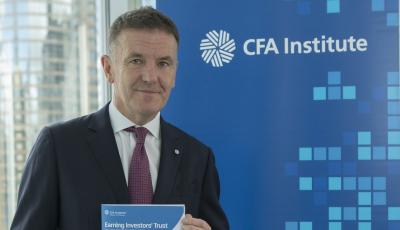Strategy & Practice Management
Hubbis’s Learning Consultant on Accentuating the Human Advantage for Better Engagement in Wealth Management

David MacDonald of The Sovereign Group
May 13, 2021
David MacDonald, Head of Learning Solutions for Hubbis, is a passionate believer in the power of human interaction. He believes that in the world of wealth management, professionals should not be fearful of the digital revolution but should use technology to enhance their inter-personal skills, the delivery of client solutions, the quality of their communication, and thereby future-proof their roles and their careers. They should also strive to be the best at what they do, and the best version of themselves for their clients, offering knowledge, empathy and sound judgement. People need people, he believes and projects that this will long be the case, so professionals in this industry should enhance and emphasise their uniquely human skills while leveraging technologies to improve their own capabilities and proposition. This is perhaps even more the case since the pandemic, as all too often, bankers and advisors have been forced to connect remotely with their clients. David was a speaker at a mid-April Hubbis virtual event on enhancing client engagement. We have summarised some of his insights in this short Q&A.
Hubbis: David, you are an expert in adult education and training people in the invaluable skills of relationship building and sales. In this remote working, virtual world we now inhabit, what has changed for wealth management practitioners?
MacDonald: “I read something of note earlier this week, actually. A company called Statista has put out the fact that on a daily basis, there are something like 300 billion emails circulating the globe. And then we add in things like Twitter, Instagram, WeChat, WhatsApp, Line, and so on and so forth.
So, how does a banker manage to catch the attention of existing clients and win new clients and new business in a virtual world? Well, there are two aspects to how we do business, generally speaking, in a virtual world, just as is the case in a face-to-face meeting world. One is keeping your existing clients very much on side when they are under unknown pressures that they've never been experiencing before. And the other aspect is trying to achieve new business acquisition, win over new clients from prospects through to onboarding.
As is so often the case, it can be as simple as going back to basics. Some practical tips.
Even in the best of times, I think anyone who is client facing should have a clear strategy on how they're going about their prospecting and what means they are going to use to connect with prospect. As well as having a clear and specific plan as to how many new prospects they are looking to acquire in any quarter or any year. Have we all given thought to that? Have we all developed a plan that we are going to follow?
Think about a contact strategy for your existing clients. Having worked around the wealth industry for as long as I have, I can say that when advisors say they are constantly in contact with clients, that does not necessarily mean that contact is driven by what the client wants or needs. Do we have a contract with our clients, and I use the “contract” term in its loosest possible interpretation, not necessarily something written and signed up to, but do we have at least a verbal contract with each client as to when they want to be contacted, how they want to be contacted, how often they want to be contacted? I suspect that, for many, there is no such agreement. All too often, it is too ad hoc, too unstructured, too reactive.
I can share with you that, for instance, there is a firm that I deal with or had been dealing with, and I thought I was still a client of. I haven't heard from them in two years, never mind through a year of pandemic, they’ve still got some business of mine, they’ve still got some money of mine in their care, but they haven't reached out to me in any shape or form for two years.
In short, I think a contact strategy and a plan of execution for your prospecting is essential before we even think about which means of communication you should employ or even whether you are skilled enough to use a virtual communication platform effectively.”
Hubbis: How do you think bankers and advisors can build trust in a virtual world?
MacDonald: “Building trust in a virtual world is a very different proposition to building trust when you're face to face, eyeball to eyeball in the same vicinity as the prospects or clients that you're dealing with. I have heard a lot of people suggest that it is just about the same thing. Well, it's not really because I think Zoom, Teams, whichever medium you are using to connect with these people virtually, it really does impede that genuine personal contact.
There is indeed a highly instinctive way that we human beings have developed in our past in order to gauge whether someone is trustworthy or not, and it is not just how well they look on screen, how nice their Zoom background is, because there is so much personal connection that is very tough to replicate in a virtual world.
So, we also need to think about what it takes for me in that medium of connectivity to make sure that I'm building that trusted relationship. The messages that I communicate – are they adding value to the prospect/client? The ideas that I present – are they client-specific and client-centric?”
Hubbis: How do bankers and advisors reach out to existing clients to help them connect to new clients via introductions or referrals?
MacDonald: “I like to use the word introductions, not referrals. I think an ‘introduction’ sounds more grown-up and professional, less salesy. Not wishing to sound like a broken record, bankers should have a plan for how many introductions they might be looking to achieve in a year, or perhaps each quarter.
Have we identified the key clients in our existing client book whom we consider to be the best centres of influence? Do we know who they know and are connected to, both professionally and personally? Do we know who their family members are? Who are their friends down at the golf club? Have we done our research?
All of those questions and the answers to them will help the bankers plan for the right moments and the right means to bring the idea of introductions to new potential clients, to friends into the conversation. These are critical moments and must be approached carefully and strategically.
I've heard of many approaches. They tend to be always questions that come right at the end of what might be a successful client exchange, on the way to the elevator, or just as you're saying ‘goodbye’, with a typical ‘Oh, by the way, if you do know anyone else that could value my advice, then please don't forget to ask them to contact me’ or something similar.
I personally feel, based on what I’ve seen and heard being applied, that these approaches are lame, and result in little or no return.
I prefer a more targeted, but still professional approach. Perhaps a question such as: ‘Who is the one person in your personal or professional network, who you know is not receiving the kind of advice and input that you seem to value from our conversation today?
And then be ready to follow that up with further questions as to how could you possibly then make contact with that individual jointly, with your existing client’s support, or individually. These people are successful in business and life; they understand the value of relationships and connections, they have probably built their own businesses or careers doing the same thing, they appreciate good advice and judgement, so don’t be afraid to ask the question.
But my advice is also not to push too hard, don’t chase for more introductions, just satisfy yourself at first with that one person that they can relate to who might benefit from your input. Think about it, if you have 50 important clients and half of them introduce potential new clients each year, that can help you build the business significantly and quite rapidly.”

Head Of Business Development, Singapore at The Sovereign Group






